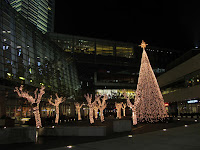[in translation, 中文原文附后]
 |
| At Jing'an Temple in Shanghai |
 |
| At a mall in Shanghai |
 |
| In Shanghai's Zhengda Square |
 |
| In Shanghai's hotel |
 |
| In a residential enclave of Shanghai |
Perhaps people so exhaust their enjoyment during Christmas, that when it actually comes time for our own spring festival, the reaction from both businesses and the populace is fatigued. Besides the dull red lanterns, sausage and smoked pork, plus the CCTV Gala Show that gets worse and worse every year, there is nothing else. Compared with people's enthusiasm for Christmas, spring festival no doubt is cast in the shadows.
 |
| In Shanghai's supermarket |
But let's cut the cackle. On Christmas day, real Christians
go to church to hear sermons, sing hymns, and read the Bible. There you will again
run into situations between laughter and tears.
At the gate of the following church, for example, a bunch of Henanese sit
there begging—
 |
| On Christmas Day, beggers at a Shanghai church |
Even beggers in Shanghai know today is Christmas. That adds
some tunes. They must have their
simple logic – merciful Christians probably won't refuse to give charity on
this special day. That is why they
deploy the most primitive ruse of bodily suffering: on a frigid winter day, sitting on icy cement
ground, wearing patched clothing and a faint smile, they languidly chant to the
church goers: Please do something kind, bosses,
please do something kind!
The foreigners pass by unfazed, but how can the fellow
Chinese bear it? One digs into his pocket and hands money to a begging woman. The woman takes the bills and says loudly, Thank you, you the good heart! You really
are a living Buddha!
海上圣诞
不知从何时起,国人对本土的传统节日感情越来越淡漠,对西方的洋派节日却越来越热衷。经济萧条和末日恐慌都hold不住这座城市迎接圣诞的热情。以一向走在时尚前列的上海来说,这也许并不奇怪,这里本来老外就多嘛,外资企业云集之地,凑个热闹过过洋节没啥稀奇。可整座城市为一个洋节集体疯魔还是比较少见的,这种暗合基督精神的谦卑简直让仅占人口总数千分之五左右的老外受宠若惊——这,这也太和谐了吧!
每年临近圣诞,满满的喜气就流水般渗透着这城市的每一个角落。黑幕拉下时,更是火树银花彩灯绚烂,圣曲音乐不绝于耳,兴奋的年轻人个个妆容精致花枝招展,无论是大商场还是小超市、无论是银行还是饭店、无论是外资企业还是合资企业还是国有企业甚至政府机关,门口都必然立着一颗挂满霓虹灯和礼品包的圣诞树,甚至连居民小区和普通医院都无一幸免,不管你是佛教徒还是回教徒,进小区、进医院你就得庆贺圣诞。
前段时间在流传一个段子,评比世上最神秘的组织,得第一的是中国的“有关部门”。我疑心,把圣诞树放遍上海的所有空地,就是有关部门安排的光荣任务。
大约是圣诞期间人们把所有的欢喜都用到了极致,真到了我们自己的春节时,无论是商家还是民众,反应都比较疲软,除却乏味的红灯笼外加香肠腊肉再加上一台一年烂似一年的春晚,别无它物。与人们对待圣诞的热情比起来,春节无疑是黯然失色。
上海人眼下有句惯用的话叫“老有腔调的”,是有趣有特色的意思。是不是因为中国人本性太枯燥和压抑了,以至于所有的传统节日都越过越没"腔调",不然,我们怎会对比较有趣和放松的万圣节、情人节、圣诞节从莫名惊艳到津津乐道到欣然接受呢?
至于“万圣节”为何要带面具?“情人节”的来历是什么?“圣诞节”是庆贺谁的诞生?人们一概不管,有大餐吃、有打折商品抢,有花花世界看,这才是王道!
闲话少说,真正的基督徒会去教堂听听布道、唱唱赞歌、读读圣经,过一个真正意义上的圣诞。不曾想,在教堂,你仍然会碰到啼笑皆非的场面,
例如一帮河南人坐在教堂门前乞讨。
上海的叫花子也知道今天是圣诞节。有腔调吧?
他们一定是用朴素的逻辑推断——慈悲的基督徒总不会在这个特殊的日子里拒绝施舍的。
所以他们就用了最原始的苦肉计,在寒冷的深冬,坐在冰冷的水泥地上,脸上带着似笑非笑的表情,懒洋洋地向出入教堂的信徒们机械性吟哦:行行好吧,各位老板行行好吧。
老外们比较矜持,目不斜视地走过去了,同胞们情何以堪!有人掏出票子递给一位大妈,那妇人一边接了一边朗声道:谢谢好心人,你真是活菩萨呀你!
好心人仰天长叹:喔我的主呀!
3 comments:
Thanks for posting these translated pieces!
Some quick comments about beggars outside Chinese churches.
In our city, beggars are at the church gates every Sunday; they know when the churches are holding events.
The article seems to imply that local Chinese feel more compelled than foreigners to help the beggars (or something), and maybe that's true I don't know, but there's an interesting twist to that situation. The foreign Christians in our city do do stuff with the beggars, but they have to be careful. Only foreigners of Asian ethnicity are able to be directly involved with the beggars, because white people being seen helping the beggars looks bad to the 'people of consequence'. So if we (laowais) want to do more than drop a few kuai in their cups on our way in and out of church, we had to give through our ethnically Asian friends, who are able to more easily directly interact with the beggars.
Joel, what you said is interesting. Do you mean the government would interfere with white people who help beggers?
It's only slightly related but your post, about the meaning of Christmas in China, reminds me of a very, very good short story I once read called "Christmas in China", included in the (at the time) red-hot literary magazine McSweeney's. It was about a Chinese immigrant taxi driver in New York at Christmas time.
I spent three Christmas in Shanghai and they are antiseptic, but not without a sort of charm. Merriment without the familial warmth, ad hoc celebrations without any time off from work - unlike real holidays like those domestic Chinese holidays and Asian New Year - and the weird need to consume, but why? Nanjing West Road, with the decorations and lights, and so many Chinese people expressing sympathy for my being so far away from home during my country's most earnest and charitable moment. Now I am back in the U.S. and in my workplace there are many Jews and Russians, yet the spirit is still solidly "there". As crazy as this sounds, in the U.S. it's a big mistake to limit Christmas to Christians. No one in my family is Christian and I have very little familiarity with Christianity outside of (having grown up here) American pop culture norms and practices, but I get it entirely, to the point of aching nostalgia and enveloping sentiment. It's entirely cultural rather than religious, the going to church seems to me to be part of a ritual practiced out of solemness rather than faith.
Real holidays are marked with sacrifices by the state, companies, and the common man. This is true in every country in the world. Time off from work. Company parties. closed schools. Expressions of concern that seem real enough when uttered. Nevermind red bows or seasonal songs; I don't say this to be flip or dismissive of Christmas celebrations in China, but really it's just not possible, and the disjointed gesticulations do help a bit, but they also serve to highlight the oddity. For me, I would much, much rather that foreigners in China could somehow be able to experience what Chinese people must feel during the more sacred domestic holidays. I remember reading an article in the Shanghai paper about a group of white collar workers, all from the same area of Shanxi(?) who hired a plane to fly them home for national week. That is the stuff of holidays.
Finally, most foreigners are too damn snarky and snide to enjoy Chinese attempts at celebrating Christmas. Maybe this applies to me too, IDK. Lazy bloggers and drunken yahoos guffawing and snickering about the attempts by Chinese to participate in the most un-Chinese holiday... tended to make the situation worse.
Thank goodness for New Years! Something we can all agree on.
James
Post a Comment